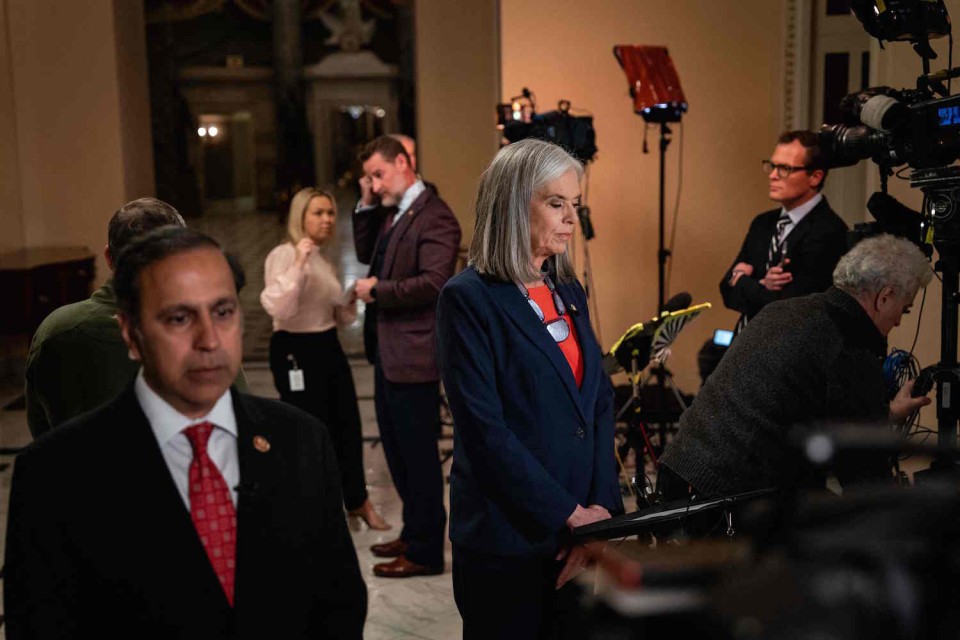
By Frankie TAGGART
WASHINGTON, Jan 18, 2024 (AFP) – The US Congress green-lit temporary funding Thursday to thwart a partial government shutdown that threatened the functions of multiple key federal agencies and could have seen thousands of employees sent home without pay.
With large sections of the government due to close at the end of Friday, the House of Representatives voted to keep the lights for at least another six weeks, approving a measure that had advanced earlier from the Senate.
The last-ditch “continuing resolution” was pitched by leaders in the upper chamber as public workers were preparing to be sent home unpaid, upending government functions from military operations to food aid to federal policymaking.
Complicating the negotiations, forecasts for a brutal winter storm curtailed the lawmakers’ work, with Congress announcing that it would be closed for business all day Friday.
“We have good news for America: There will not be a shutdown on Friday,” Democratic Senate leader Chuck Schumer said in a speech to colleagues.
“Because both sides have worked together, the government will stay open. Services will not be disrupted. We will avoid a needless disaster.”
The short-term fix was pitched after negotiations on a full-year budget were stalled by the demands of House Republicans for deep spending cuts and sweeping immigration reforms that are dead on arrival in the more moderate Senate.
Under the agreement, services and administration related to agriculture, energy and water, military construction and veterans’ programs, transport and housing — all due to grind to a halt at the weekend — will be funded until March 1.
The military, Justice Department, border security, Congress and many other federal agencies and departments were due to run out of money at the start of February but will now be able to function until March 8.
That will give lawmakers more time to set the full-year budget in line with spending limits that Democrats and Republicans agreed to last year.
– Dysfunction –
Even on rare occasions of cross-party unity, Congress can work at a glacial pace.
But lawmakers redoubled efforts to get the legislation to President Joe Biden’s desk as the National Weather Service forecast up to four inches (10 centimeters) of snowfall in the Washington suburbs overnight.
Despite the urgency, dozens of conservatives in the House voted against the stop-gap measure. But Democrats provided Republican Speaker Mike Johnson enough backing to smooth its passage.
Relying on Democratic support to cancel out Republican no-votes is the practice that got Johnson’s predecessor Kevin McCarthy axed in an October rebellion by his own party. Leading right-wingers have made clear that the current speaker risks the same outcome.
The inability of lawmakers to pass a full budget for a fiscal year that started almost four months ago has highlighted dysfunction in Congress, which is also deadlocked on foreign aid requested urgently by the White House.
Republicans are demanding tightened border security and strict immigration curbs before they will consider Biden’s request for $106 billion in supplemental cash, mostly for Ukraine and Israel.
Party leaders in the Senate are strong supporters of Ukraine aid but many hard-liners in the House are skeptical that handing Kyiv more money to repel the two-year-old Russian invasion is in US interests.
Both sides agree that record numbers of migrants crossing from Mexico is a crisis that needs to be addressed, although they disagree on the response.
Schumer, the leader of the Democratic Senate majority, aims to introduce a bipartisan border security and foreign aid bill next week, although Johnson has refused to commit to bringing the bill to the House floor.
Having sounded the alarm for more than a year over the “humanitarian catastrophe” of the migrant surge, Republicans will face accusations of bad faith if they refuse even to consider the package.
Johnson told Fox News he had been talking about the border “pretty frequently” with former president Donald Trump, who is running for reelection and is pressuring Republicans not to give Biden a win on immigration.







